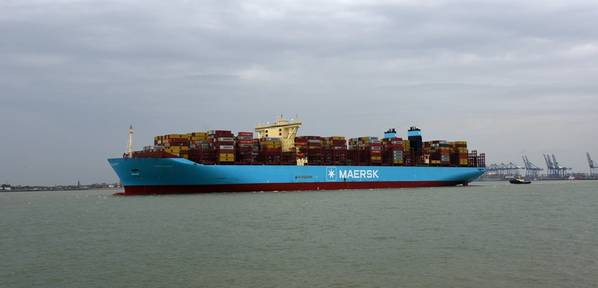
Maersk expects global container shipping growth to slow from a strong start to the year, when customers soaked up goods to prevent them from being held up by Red Sea attacks and other disruptions, it said on Wednesday.
The Danish company, viewed as a barometer of world trade, said global container demand increased about 7% year-on-year in the first half of the year, boosted by robust demand from Europe, emerging markets and strong Chinese exports.
"That is a lot and we expect the second half of the year to be less strong," CEO Vincent Clerc told a press conference.
For the full year, Maersk expects global container market volumes to increase by 4% to 6%.
Rival CMA CGM said last month it saw restocking by U.S. firms continuing in the second quarter, partly due to concerns that geopolitical tension with China and that potential new tariffs may disrupt trade.
"The United States and China have entered a more competitive relationship and that is the case no matter who wins the (U.S.) election," Maersk's Clerc told a press conference after presenting April-June earnings.
"We could be seeing some pulling forward of demand most notably in North America with the U.S. election in November and the uncertainty about future import tariffs," he said on an investor call later on Wednesday.
But Maersk had not seen unusually high U.S. stockpiling, he added, cautioning there was still little clarity around supply and demand in the fourth quarter.
"How much Christmas decorations etc are already in stock in Europe and the U.S. ... because they were afraid it will be delayed during the third quarter, I don't know, and that is why we flag some kind of uncertainty," Clerc said.
Maersk is in the process of signing orders for 50 to 60 new container vessels for delivery from 2026 to 2030 as part of its fleet renewal, replacing older vessels to keep its overall transport capacity steady, it said.
The ramped-up fleet renewal plan will boost Maersk's capital expenditure for 2024-2025 by $1 billion to $10-11 billion compared with previous guidance of $9-10 billion, it said.
The company's share price fell as much as 4.5%, before paring losses to trade 1.6% lower at 1244 GMT, taking its year-to-date decline to 10.7%. Analysts cited the higher capital expenditure guidance as one of the negative factors.
Maersk also confirmed preliminary second-quarter earnings released last week, when it raised its profit forecast for the third time since May, citing higher freight rates due to the Red Sea crisis and solid container shipping demand.
Attacks by Houthi militants on Red Sea shipping have drawn U.S. and British retaliatory strikes and disrupted global trade, but Maersk and rivals have benefited from longer sailing times and soaring freight rates as ships are rerouted around Africa.
(Reuters - Reporting by Stine Jacobsen; Editing by Bernadette Baum, Emelia Sithole-Matarise and Mark Potter)



